Prenatal Diagnosis: Advantages and Ethical Considerations
VerifiedAdded on 2023/03/31
|10
|2469
|462
AI Summary
This essay discusses the concept of prenatal diagnosis and its advantages in identifying genetic defects and disabilities in the fetus. It explores the ethical considerations surrounding selective abortion as an option for parents with a genetically defected fetus. The essay also delves into the various prevention strategies that can be adopted to control genetic defects in the fetus. The topic of genetic testing for deafness and disability rights is also examined, along with the ethical issues associated with prenatal testing and selective abortion. Overall, the essay provides insights into the benefits and challenges of prenatal diagnosis.
Contribute Materials
Your contribution can guide someone’s learning journey. Share your
documents today.
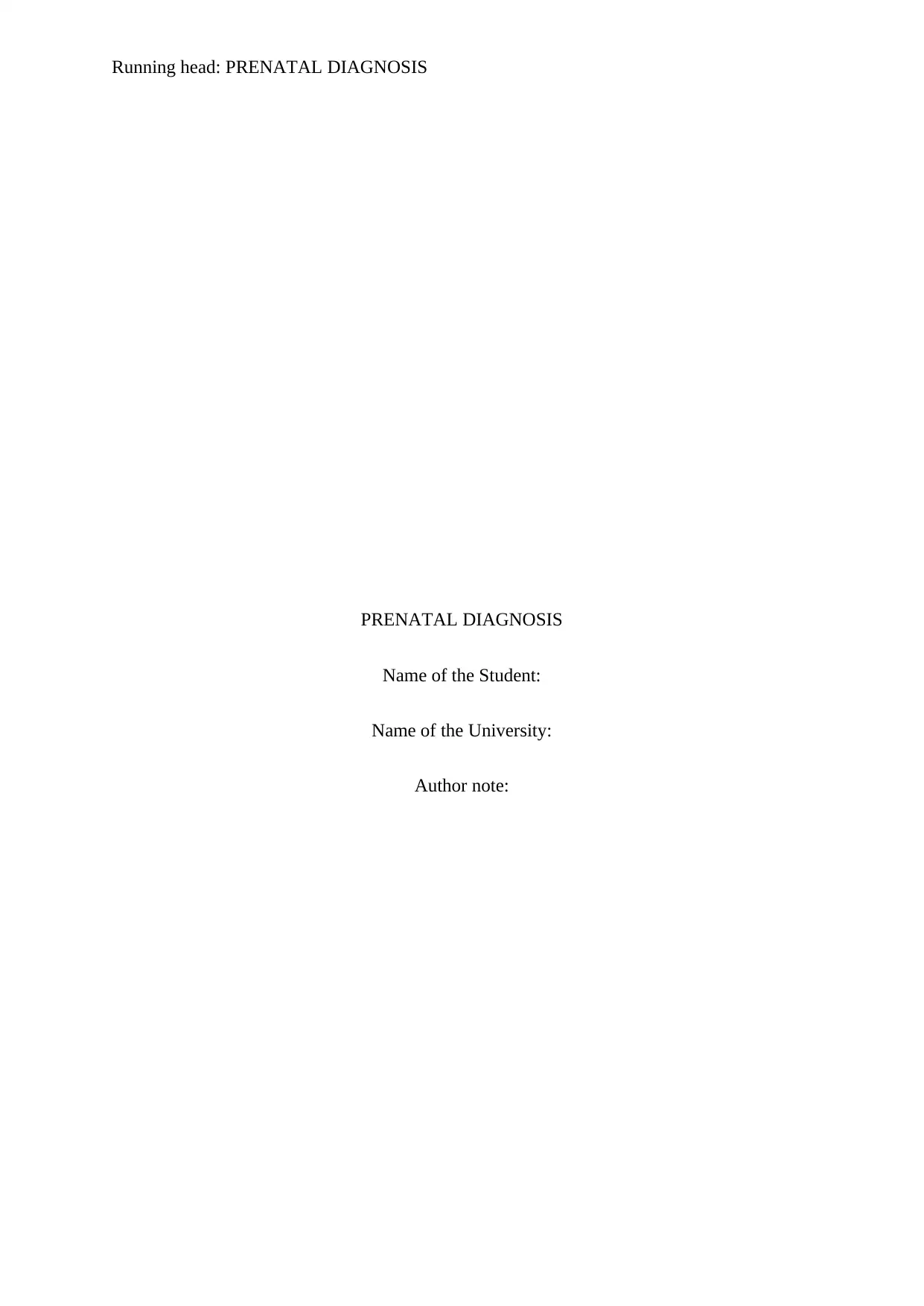
Running head: PRENATAL DIAGNOSIS
PRENATAL DIAGNOSIS
Name of the Student:
Name of the University:
Author note:
PRENATAL DIAGNOSIS
Name of the Student:
Name of the University:
Author note:
Secure Best Marks with AI Grader
Need help grading? Try our AI Grader for instant feedback on your assignments.
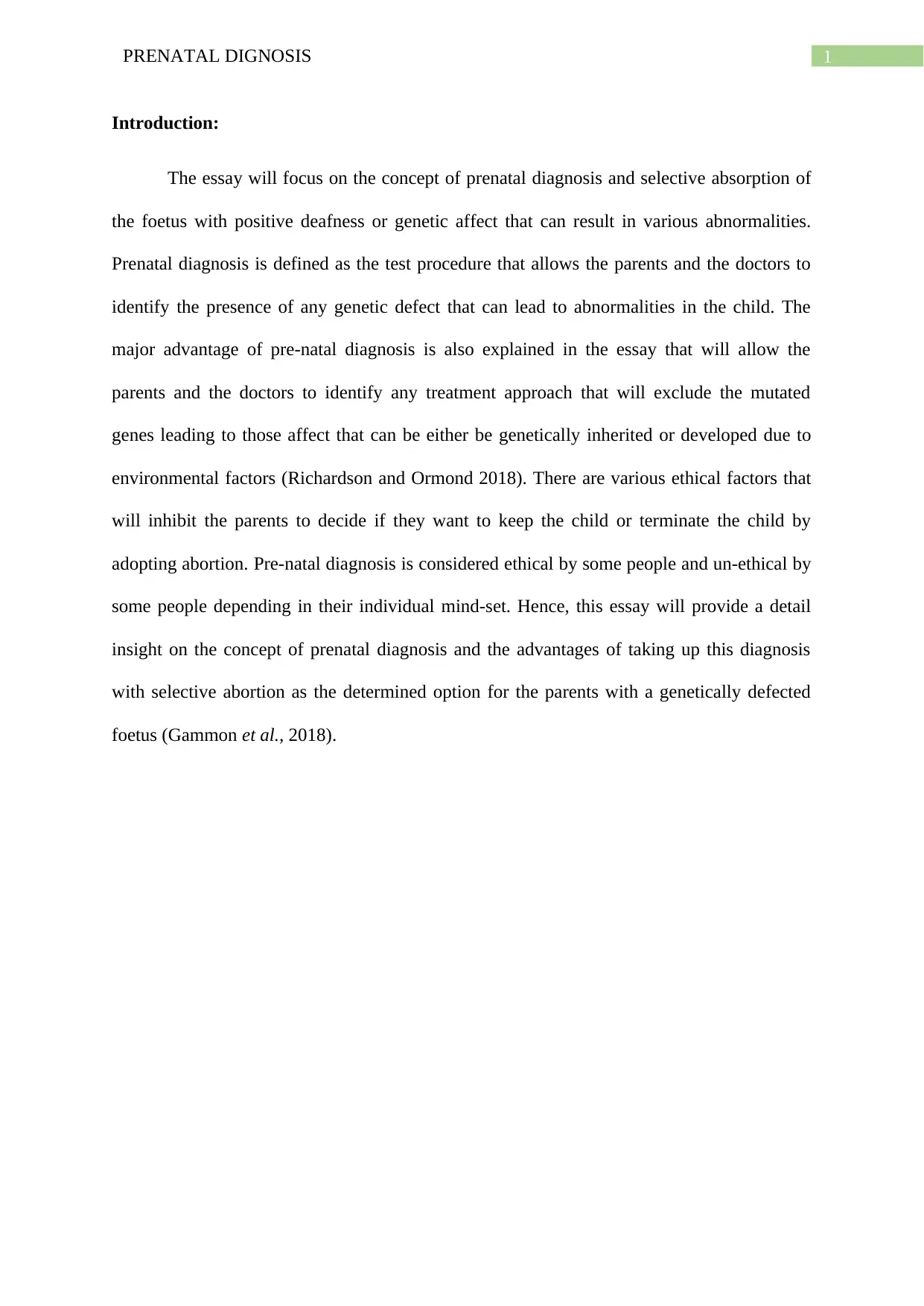
1PRENATAL DIGNOSIS
Introduction:
The essay will focus on the concept of prenatal diagnosis and selective absorption of
the foetus with positive deafness or genetic affect that can result in various abnormalities.
Prenatal diagnosis is defined as the test procedure that allows the parents and the doctors to
identify the presence of any genetic defect that can lead to abnormalities in the child. The
major advantage of pre-natal diagnosis is also explained in the essay that will allow the
parents and the doctors to identify any treatment approach that will exclude the mutated
genes leading to those affect that can be either be genetically inherited or developed due to
environmental factors (Richardson and Ormond 2018). There are various ethical factors that
will inhibit the parents to decide if they want to keep the child or terminate the child by
adopting abortion. Pre-natal diagnosis is considered ethical by some people and un-ethical by
some people depending in their individual mind-set. Hence, this essay will provide a detail
insight on the concept of prenatal diagnosis and the advantages of taking up this diagnosis
with selective abortion as the determined option for the parents with a genetically defected
foetus (Gammon et al., 2018).
Introduction:
The essay will focus on the concept of prenatal diagnosis and selective absorption of
the foetus with positive deafness or genetic affect that can result in various abnormalities.
Prenatal diagnosis is defined as the test procedure that allows the parents and the doctors to
identify the presence of any genetic defect that can lead to abnormalities in the child. The
major advantage of pre-natal diagnosis is also explained in the essay that will allow the
parents and the doctors to identify any treatment approach that will exclude the mutated
genes leading to those affect that can be either be genetically inherited or developed due to
environmental factors (Richardson and Ormond 2018). There are various ethical factors that
will inhibit the parents to decide if they want to keep the child or terminate the child by
adopting abortion. Pre-natal diagnosis is considered ethical by some people and un-ethical by
some people depending in their individual mind-set. Hence, this essay will provide a detail
insight on the concept of prenatal diagnosis and the advantages of taking up this diagnosis
with selective abortion as the determined option for the parents with a genetically defected
foetus (Gammon et al., 2018).
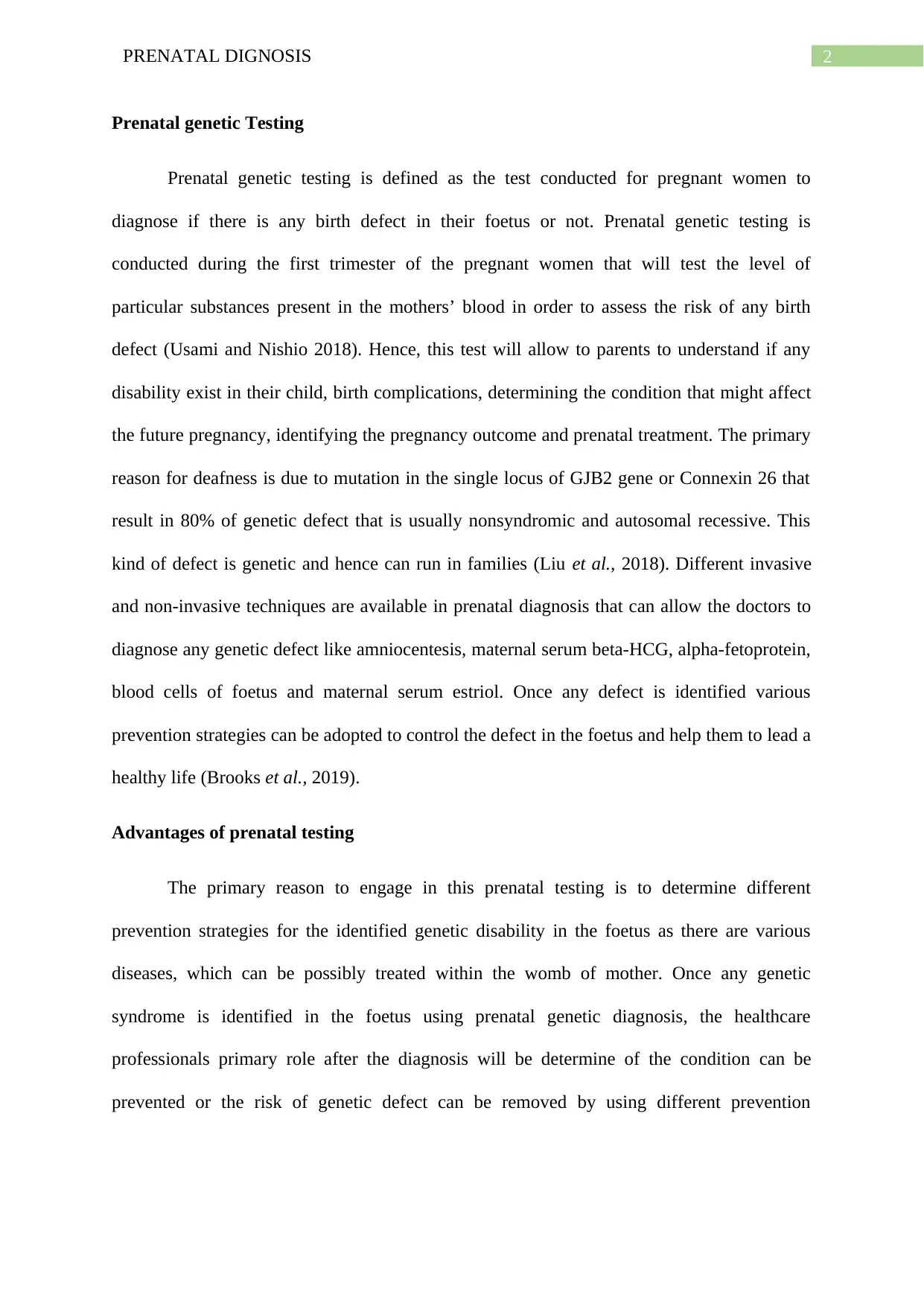
2PRENATAL DIGNOSIS
Prenatal genetic Testing
Prenatal genetic testing is defined as the test conducted for pregnant women to
diagnose if there is any birth defect in their foetus or not. Prenatal genetic testing is
conducted during the first trimester of the pregnant women that will test the level of
particular substances present in the mothers’ blood in order to assess the risk of any birth
defect (Usami and Nishio 2018). Hence, this test will allow to parents to understand if any
disability exist in their child, birth complications, determining the condition that might affect
the future pregnancy, identifying the pregnancy outcome and prenatal treatment. The primary
reason for deafness is due to mutation in the single locus of GJB2 gene or Connexin 26 that
result in 80% of genetic defect that is usually nonsyndromic and autosomal recessive. This
kind of defect is genetic and hence can run in families (Liu et al., 2018). Different invasive
and non-invasive techniques are available in prenatal diagnosis that can allow the doctors to
diagnose any genetic defect like amniocentesis, maternal serum beta-HCG, alpha-fetoprotein,
blood cells of foetus and maternal serum estriol. Once any defect is identified various
prevention strategies can be adopted to control the defect in the foetus and help them to lead a
healthy life (Brooks et al., 2019).
Advantages of prenatal testing
The primary reason to engage in this prenatal testing is to determine different
prevention strategies for the identified genetic disability in the foetus as there are various
diseases, which can be possibly treated within the womb of mother. Once any genetic
syndrome is identified in the foetus using prenatal genetic diagnosis, the healthcare
professionals primary role after the diagnosis will be determine of the condition can be
prevented or the risk of genetic defect can be removed by using different prevention
Prenatal genetic Testing
Prenatal genetic testing is defined as the test conducted for pregnant women to
diagnose if there is any birth defect in their foetus or not. Prenatal genetic testing is
conducted during the first trimester of the pregnant women that will test the level of
particular substances present in the mothers’ blood in order to assess the risk of any birth
defect (Usami and Nishio 2018). Hence, this test will allow to parents to understand if any
disability exist in their child, birth complications, determining the condition that might affect
the future pregnancy, identifying the pregnancy outcome and prenatal treatment. The primary
reason for deafness is due to mutation in the single locus of GJB2 gene or Connexin 26 that
result in 80% of genetic defect that is usually nonsyndromic and autosomal recessive. This
kind of defect is genetic and hence can run in families (Liu et al., 2018). Different invasive
and non-invasive techniques are available in prenatal diagnosis that can allow the doctors to
diagnose any genetic defect like amniocentesis, maternal serum beta-HCG, alpha-fetoprotein,
blood cells of foetus and maternal serum estriol. Once any defect is identified various
prevention strategies can be adopted to control the defect in the foetus and help them to lead a
healthy life (Brooks et al., 2019).
Advantages of prenatal testing
The primary reason to engage in this prenatal testing is to determine different
prevention strategies for the identified genetic disability in the foetus as there are various
diseases, which can be possibly treated within the womb of mother. Once any genetic
syndrome is identified in the foetus using prenatal genetic diagnosis, the healthcare
professionals primary role after the diagnosis will be determine of the condition can be
prevented or the risk of genetic defect can be removed by using different prevention
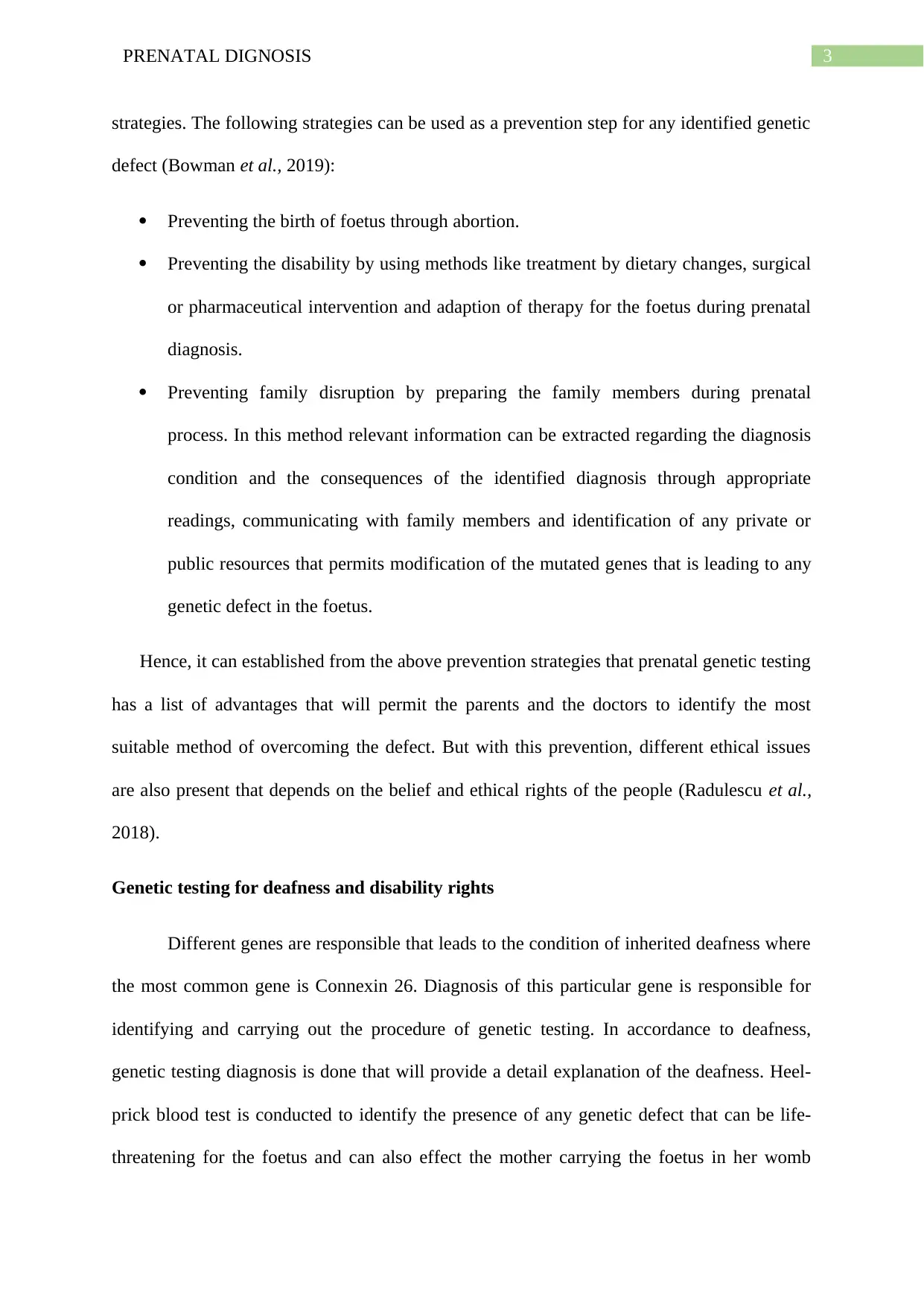
3PRENATAL DIGNOSIS
strategies. The following strategies can be used as a prevention step for any identified genetic
defect (Bowman et al., 2019):
Preventing the birth of foetus through abortion.
Preventing the disability by using methods like treatment by dietary changes, surgical
or pharmaceutical intervention and adaption of therapy for the foetus during prenatal
diagnosis.
Preventing family disruption by preparing the family members during prenatal
process. In this method relevant information can be extracted regarding the diagnosis
condition and the consequences of the identified diagnosis through appropriate
readings, communicating with family members and identification of any private or
public resources that permits modification of the mutated genes that is leading to any
genetic defect in the foetus.
Hence, it can established from the above prevention strategies that prenatal genetic testing
has a list of advantages that will permit the parents and the doctors to identify the most
suitable method of overcoming the defect. But with this prevention, different ethical issues
are also present that depends on the belief and ethical rights of the people (Radulescu et al.,
2018).
Genetic testing for deafness and disability rights
Different genes are responsible that leads to the condition of inherited deafness where
the most common gene is Connexin 26. Diagnosis of this particular gene is responsible for
identifying and carrying out the procedure of genetic testing. In accordance to deafness,
genetic testing diagnosis is done that will provide a detail explanation of the deafness. Heel-
prick blood test is conducted to identify the presence of any genetic defect that can be life-
threatening for the foetus and can also effect the mother carrying the foetus in her womb
strategies. The following strategies can be used as a prevention step for any identified genetic
defect (Bowman et al., 2019):
Preventing the birth of foetus through abortion.
Preventing the disability by using methods like treatment by dietary changes, surgical
or pharmaceutical intervention and adaption of therapy for the foetus during prenatal
diagnosis.
Preventing family disruption by preparing the family members during prenatal
process. In this method relevant information can be extracted regarding the diagnosis
condition and the consequences of the identified diagnosis through appropriate
readings, communicating with family members and identification of any private or
public resources that permits modification of the mutated genes that is leading to any
genetic defect in the foetus.
Hence, it can established from the above prevention strategies that prenatal genetic testing
has a list of advantages that will permit the parents and the doctors to identify the most
suitable method of overcoming the defect. But with this prevention, different ethical issues
are also present that depends on the belief and ethical rights of the people (Radulescu et al.,
2018).
Genetic testing for deafness and disability rights
Different genes are responsible that leads to the condition of inherited deafness where
the most common gene is Connexin 26. Diagnosis of this particular gene is responsible for
identifying and carrying out the procedure of genetic testing. In accordance to deafness,
genetic testing diagnosis is done that will provide a detail explanation of the deafness. Heel-
prick blood test is conducted to identify the presence of any genetic defect that can be life-
threatening for the foetus and can also effect the mother carrying the foetus in her womb
Secure Best Marks with AI Grader
Need help grading? Try our AI Grader for instant feedback on your assignments.
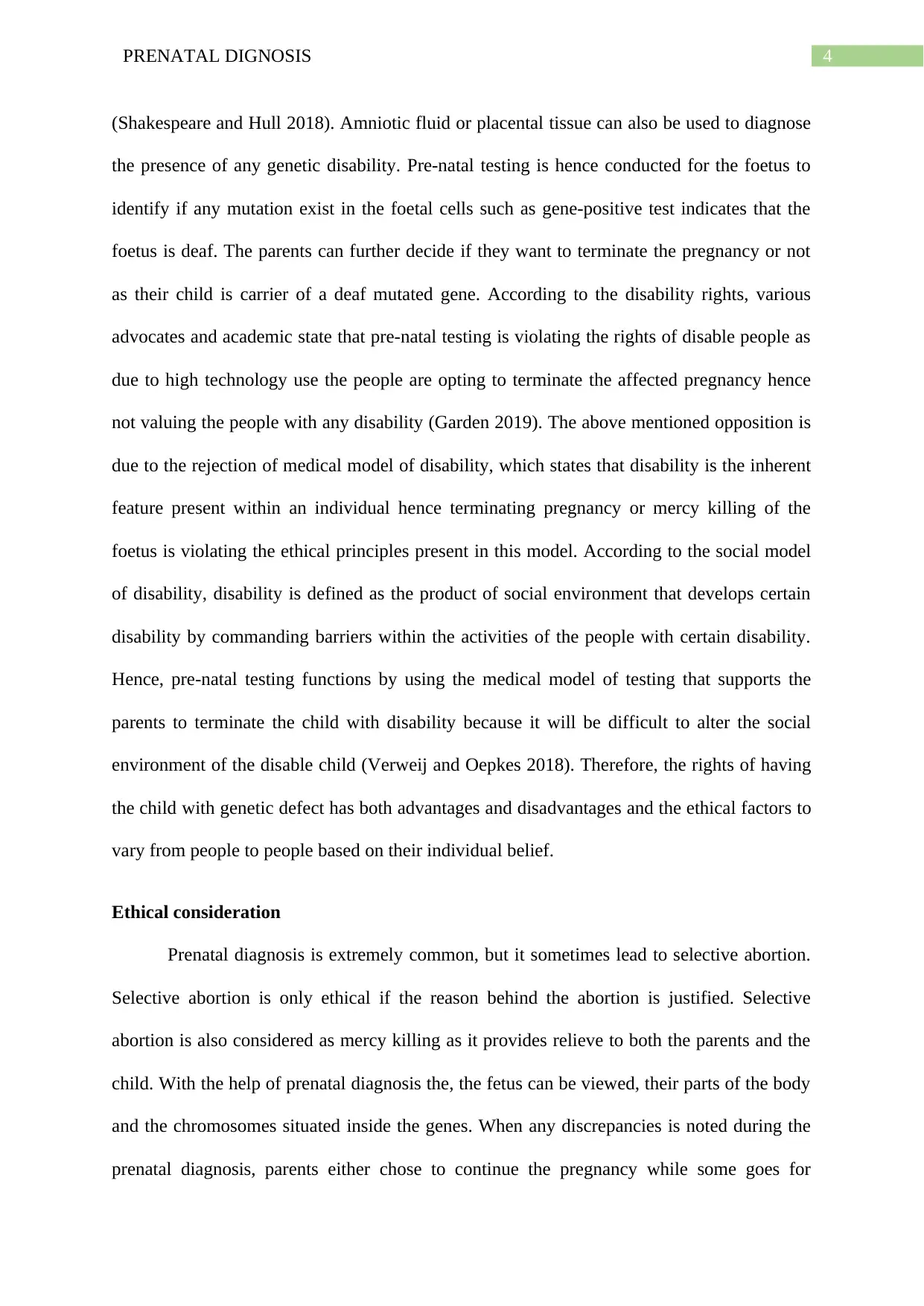
4PRENATAL DIGNOSIS
(Shakespeare and Hull 2018). Amniotic fluid or placental tissue can also be used to diagnose
the presence of any genetic disability. Pre-natal testing is hence conducted for the foetus to
identify if any mutation exist in the foetal cells such as gene-positive test indicates that the
foetus is deaf. The parents can further decide if they want to terminate the pregnancy or not
as their child is carrier of a deaf mutated gene. According to the disability rights, various
advocates and academic state that pre-natal testing is violating the rights of disable people as
due to high technology use the people are opting to terminate the affected pregnancy hence
not valuing the people with any disability (Garden 2019). The above mentioned opposition is
due to the rejection of medical model of disability, which states that disability is the inherent
feature present within an individual hence terminating pregnancy or mercy killing of the
foetus is violating the ethical principles present in this model. According to the social model
of disability, disability is defined as the product of social environment that develops certain
disability by commanding barriers within the activities of the people with certain disability.
Hence, pre-natal testing functions by using the medical model of testing that supports the
parents to terminate the child with disability because it will be difficult to alter the social
environment of the disable child (Verweij and Oepkes 2018). Therefore, the rights of having
the child with genetic defect has both advantages and disadvantages and the ethical factors to
vary from people to people based on their individual belief.
Ethical consideration
Prenatal diagnosis is extremely common, but it sometimes lead to selective abortion.
Selective abortion is only ethical if the reason behind the abortion is justified. Selective
abortion is also considered as mercy killing as it provides relieve to both the parents and the
child. With the help of prenatal diagnosis the, the fetus can be viewed, their parts of the body
and the chromosomes situated inside the genes. When any discrepancies is noted during the
prenatal diagnosis, parents either chose to continue the pregnancy while some goes for
(Shakespeare and Hull 2018). Amniotic fluid or placental tissue can also be used to diagnose
the presence of any genetic disability. Pre-natal testing is hence conducted for the foetus to
identify if any mutation exist in the foetal cells such as gene-positive test indicates that the
foetus is deaf. The parents can further decide if they want to terminate the pregnancy or not
as their child is carrier of a deaf mutated gene. According to the disability rights, various
advocates and academic state that pre-natal testing is violating the rights of disable people as
due to high technology use the people are opting to terminate the affected pregnancy hence
not valuing the people with any disability (Garden 2019). The above mentioned opposition is
due to the rejection of medical model of disability, which states that disability is the inherent
feature present within an individual hence terminating pregnancy or mercy killing of the
foetus is violating the ethical principles present in this model. According to the social model
of disability, disability is defined as the product of social environment that develops certain
disability by commanding barriers within the activities of the people with certain disability.
Hence, pre-natal testing functions by using the medical model of testing that supports the
parents to terminate the child with disability because it will be difficult to alter the social
environment of the disable child (Verweij and Oepkes 2018). Therefore, the rights of having
the child with genetic defect has both advantages and disadvantages and the ethical factors to
vary from people to people based on their individual belief.
Ethical consideration
Prenatal diagnosis is extremely common, but it sometimes lead to selective abortion.
Selective abortion is only ethical if the reason behind the abortion is justified. Selective
abortion is also considered as mercy killing as it provides relieve to both the parents and the
child. With the help of prenatal diagnosis the, the fetus can be viewed, their parts of the body
and the chromosomes situated inside the genes. When any discrepancies is noted during the
prenatal diagnosis, parents either chose to continue the pregnancy while some goes for
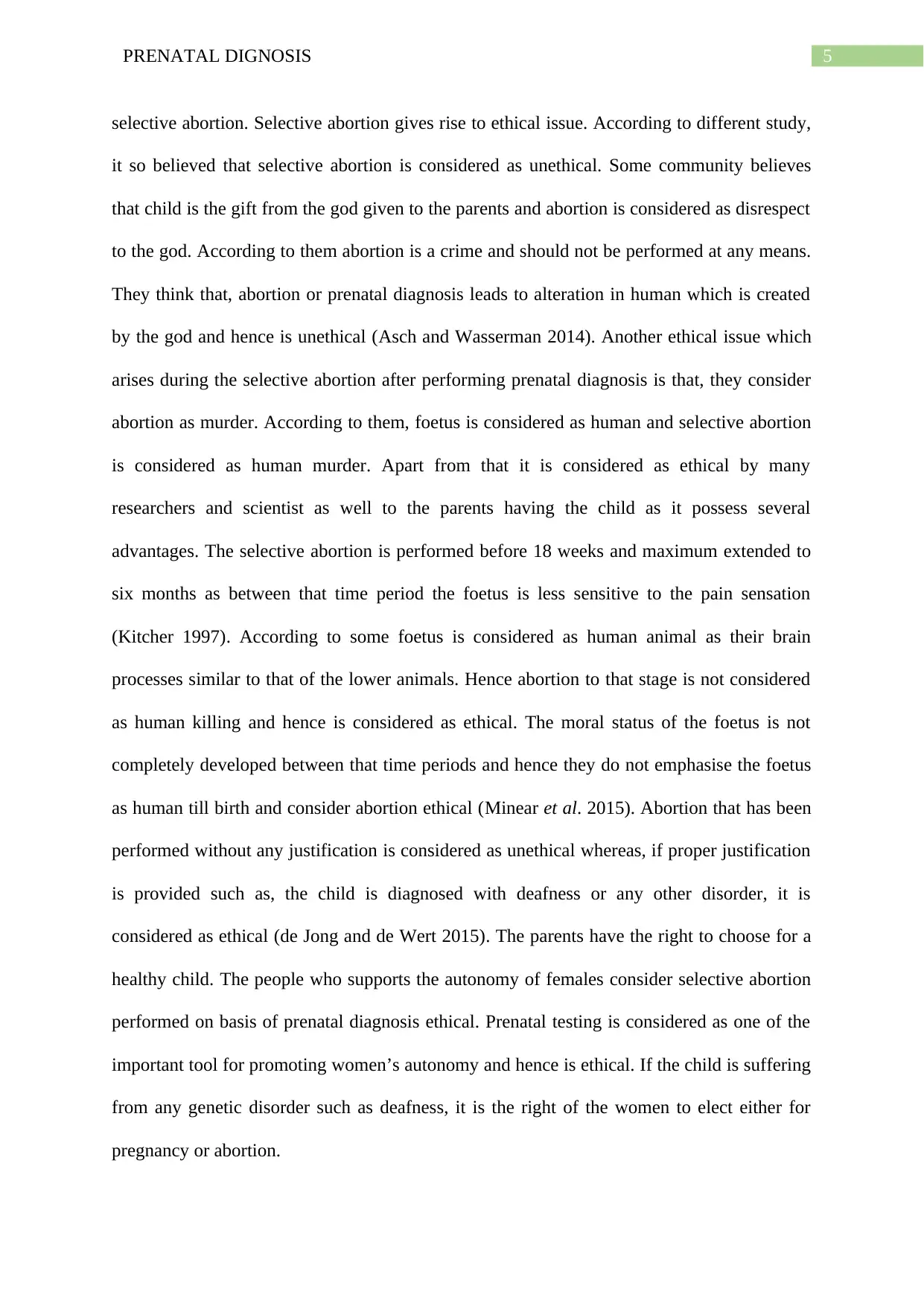
5PRENATAL DIGNOSIS
selective abortion. Selective abortion gives rise to ethical issue. According to different study,
it so believed that selective abortion is considered as unethical. Some community believes
that child is the gift from the god given to the parents and abortion is considered as disrespect
to the god. According to them abortion is a crime and should not be performed at any means.
They think that, abortion or prenatal diagnosis leads to alteration in human which is created
by the god and hence is unethical (Asch and Wasserman 2014). Another ethical issue which
arises during the selective abortion after performing prenatal diagnosis is that, they consider
abortion as murder. According to them, foetus is considered as human and selective abortion
is considered as human murder. Apart from that it is considered as ethical by many
researchers and scientist as well to the parents having the child as it possess several
advantages. The selective abortion is performed before 18 weeks and maximum extended to
six months as between that time period the foetus is less sensitive to the pain sensation
(Kitcher 1997). According to some foetus is considered as human animal as their brain
processes similar to that of the lower animals. Hence abortion to that stage is not considered
as human killing and hence is considered as ethical. The moral status of the foetus is not
completely developed between that time periods and hence they do not emphasise the foetus
as human till birth and consider abortion ethical (Minear et al. 2015). Abortion that has been
performed without any justification is considered as unethical whereas, if proper justification
is provided such as, the child is diagnosed with deafness or any other disorder, it is
considered as ethical (de Jong and de Wert 2015). The parents have the right to choose for a
healthy child. The people who supports the autonomy of females consider selective abortion
performed on basis of prenatal diagnosis ethical. Prenatal testing is considered as one of the
important tool for promoting women’s autonomy and hence is ethical. If the child is suffering
from any genetic disorder such as deafness, it is the right of the women to elect either for
pregnancy or abortion.
selective abortion. Selective abortion gives rise to ethical issue. According to different study,
it so believed that selective abortion is considered as unethical. Some community believes
that child is the gift from the god given to the parents and abortion is considered as disrespect
to the god. According to them abortion is a crime and should not be performed at any means.
They think that, abortion or prenatal diagnosis leads to alteration in human which is created
by the god and hence is unethical (Asch and Wasserman 2014). Another ethical issue which
arises during the selective abortion after performing prenatal diagnosis is that, they consider
abortion as murder. According to them, foetus is considered as human and selective abortion
is considered as human murder. Apart from that it is considered as ethical by many
researchers and scientist as well to the parents having the child as it possess several
advantages. The selective abortion is performed before 18 weeks and maximum extended to
six months as between that time period the foetus is less sensitive to the pain sensation
(Kitcher 1997). According to some foetus is considered as human animal as their brain
processes similar to that of the lower animals. Hence abortion to that stage is not considered
as human killing and hence is considered as ethical. The moral status of the foetus is not
completely developed between that time periods and hence they do not emphasise the foetus
as human till birth and consider abortion ethical (Minear et al. 2015). Abortion that has been
performed without any justification is considered as unethical whereas, if proper justification
is provided such as, the child is diagnosed with deafness or any other disorder, it is
considered as ethical (de Jong and de Wert 2015). The parents have the right to choose for a
healthy child. The people who supports the autonomy of females consider selective abortion
performed on basis of prenatal diagnosis ethical. Prenatal testing is considered as one of the
important tool for promoting women’s autonomy and hence is ethical. If the child is suffering
from any genetic disorder such as deafness, it is the right of the women to elect either for
pregnancy or abortion.
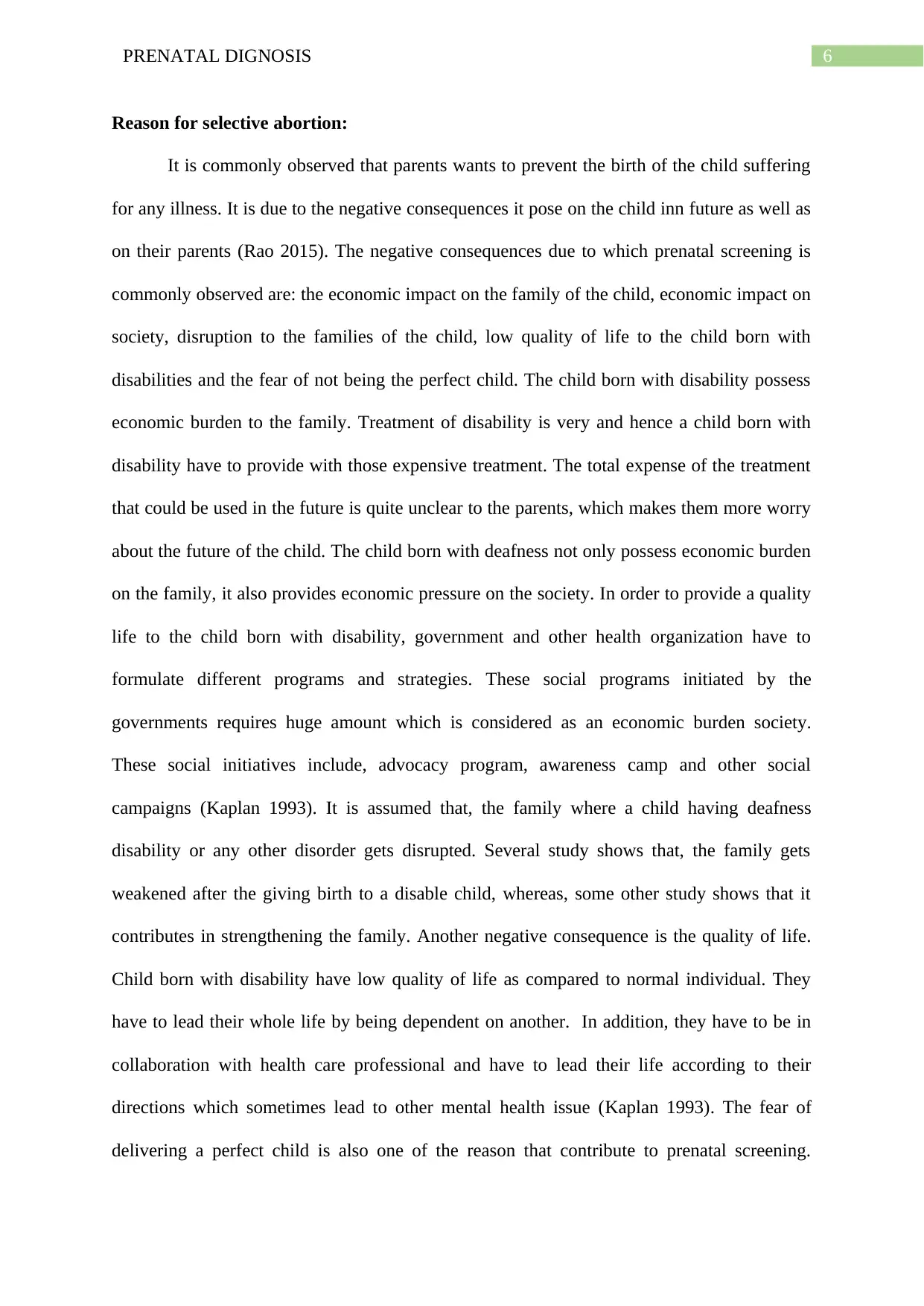
6PRENATAL DIGNOSIS
Reason for selective abortion:
It is commonly observed that parents wants to prevent the birth of the child suffering
for any illness. It is due to the negative consequences it pose on the child inn future as well as
on their parents (Rao 2015). The negative consequences due to which prenatal screening is
commonly observed are: the economic impact on the family of the child, economic impact on
society, disruption to the families of the child, low quality of life to the child born with
disabilities and the fear of not being the perfect child. The child born with disability possess
economic burden to the family. Treatment of disability is very and hence a child born with
disability have to provide with those expensive treatment. The total expense of the treatment
that could be used in the future is quite unclear to the parents, which makes them more worry
about the future of the child. The child born with deafness not only possess economic burden
on the family, it also provides economic pressure on the society. In order to provide a quality
life to the child born with disability, government and other health organization have to
formulate different programs and strategies. These social programs initiated by the
governments requires huge amount which is considered as an economic burden society.
These social initiatives include, advocacy program, awareness camp and other social
campaigns (Kaplan 1993). It is assumed that, the family where a child having deafness
disability or any other disorder gets disrupted. Several study shows that, the family gets
weakened after the giving birth to a disable child, whereas, some other study shows that it
contributes in strengthening the family. Another negative consequence is the quality of life.
Child born with disability have low quality of life as compared to normal individual. They
have to lead their whole life by being dependent on another. In addition, they have to be in
collaboration with health care professional and have to lead their life according to their
directions which sometimes lead to other mental health issue (Kaplan 1993). The fear of
delivering a perfect child is also one of the reason that contribute to prenatal screening.
Reason for selective abortion:
It is commonly observed that parents wants to prevent the birth of the child suffering
for any illness. It is due to the negative consequences it pose on the child inn future as well as
on their parents (Rao 2015). The negative consequences due to which prenatal screening is
commonly observed are: the economic impact on the family of the child, economic impact on
society, disruption to the families of the child, low quality of life to the child born with
disabilities and the fear of not being the perfect child. The child born with disability possess
economic burden to the family. Treatment of disability is very and hence a child born with
disability have to provide with those expensive treatment. The total expense of the treatment
that could be used in the future is quite unclear to the parents, which makes them more worry
about the future of the child. The child born with deafness not only possess economic burden
on the family, it also provides economic pressure on the society. In order to provide a quality
life to the child born with disability, government and other health organization have to
formulate different programs and strategies. These social programs initiated by the
governments requires huge amount which is considered as an economic burden society.
These social initiatives include, advocacy program, awareness camp and other social
campaigns (Kaplan 1993). It is assumed that, the family where a child having deafness
disability or any other disorder gets disrupted. Several study shows that, the family gets
weakened after the giving birth to a disable child, whereas, some other study shows that it
contributes in strengthening the family. Another negative consequence is the quality of life.
Child born with disability have low quality of life as compared to normal individual. They
have to lead their whole life by being dependent on another. In addition, they have to be in
collaboration with health care professional and have to lead their life according to their
directions which sometimes lead to other mental health issue (Kaplan 1993). The fear of
delivering a perfect child is also one of the reason that contribute to prenatal screening.
Paraphrase This Document
Need a fresh take? Get an instant paraphrase of this document with our AI Paraphraser
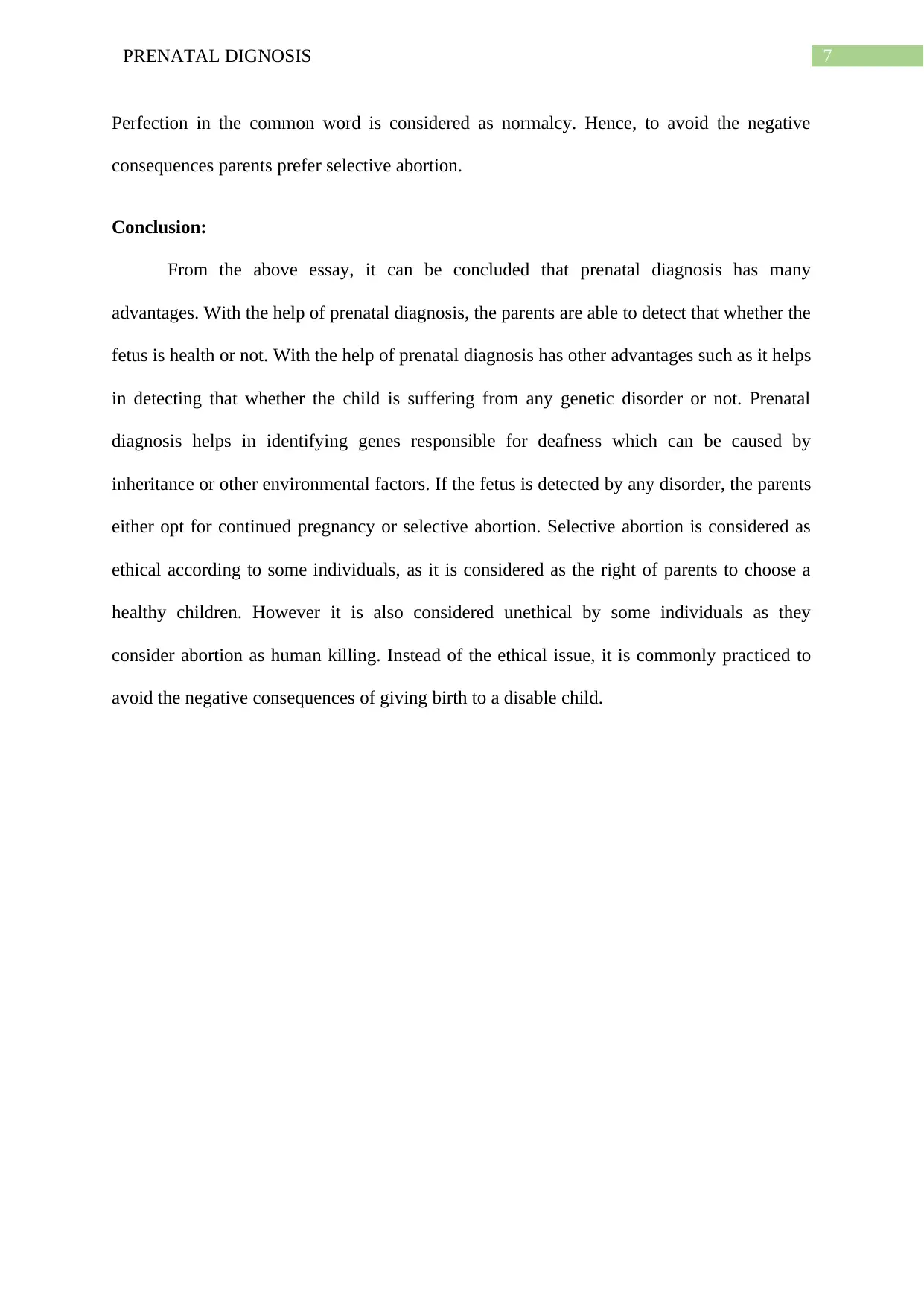
7PRENATAL DIGNOSIS
Perfection in the common word is considered as normalcy. Hence, to avoid the negative
consequences parents prefer selective abortion.
Conclusion:
From the above essay, it can be concluded that prenatal diagnosis has many
advantages. With the help of prenatal diagnosis, the parents are able to detect that whether the
fetus is health or not. With the help of prenatal diagnosis has other advantages such as it helps
in detecting that whether the child is suffering from any genetic disorder or not. Prenatal
diagnosis helps in identifying genes responsible for deafness which can be caused by
inheritance or other environmental factors. If the fetus is detected by any disorder, the parents
either opt for continued pregnancy or selective abortion. Selective abortion is considered as
ethical according to some individuals, as it is considered as the right of parents to choose a
healthy children. However it is also considered unethical by some individuals as they
consider abortion as human killing. Instead of the ethical issue, it is commonly practiced to
avoid the negative consequences of giving birth to a disable child.
Perfection in the common word is considered as normalcy. Hence, to avoid the negative
consequences parents prefer selective abortion.
Conclusion:
From the above essay, it can be concluded that prenatal diagnosis has many
advantages. With the help of prenatal diagnosis, the parents are able to detect that whether the
fetus is health or not. With the help of prenatal diagnosis has other advantages such as it helps
in detecting that whether the child is suffering from any genetic disorder or not. Prenatal
diagnosis helps in identifying genes responsible for deafness which can be caused by
inheritance or other environmental factors. If the fetus is detected by any disorder, the parents
either opt for continued pregnancy or selective abortion. Selective abortion is considered as
ethical according to some individuals, as it is considered as the right of parents to choose a
healthy children. However it is also considered unethical by some individuals as they
consider abortion as human killing. Instead of the ethical issue, it is commonly practiced to
avoid the negative consequences of giving birth to a disable child.
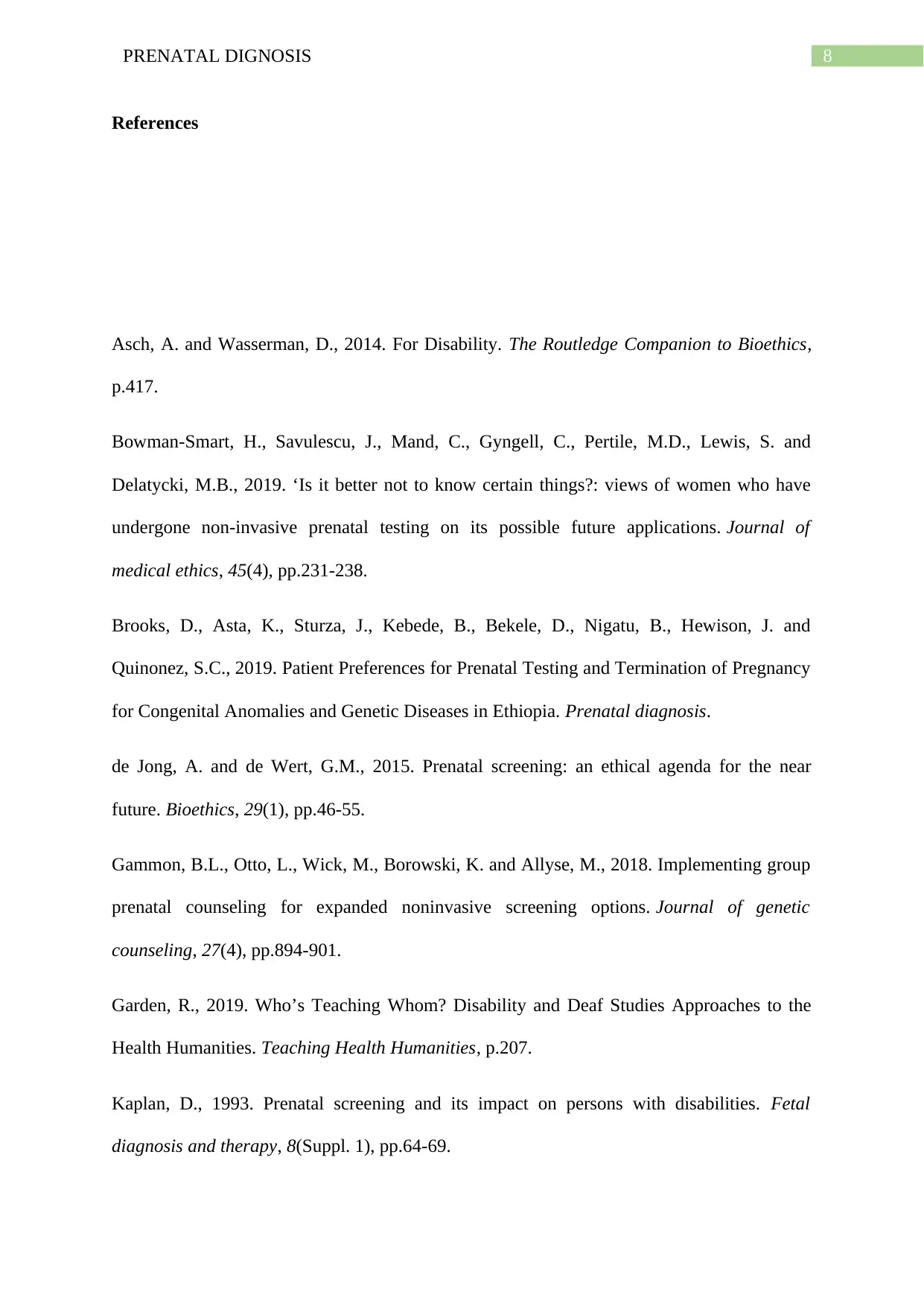
8PRENATAL DIGNOSIS
References
Asch, A. and Wasserman, D., 2014. For Disability. The Routledge Companion to Bioethics,
p.417.
Bowman-Smart, H., Savulescu, J., Mand, C., Gyngell, C., Pertile, M.D., Lewis, S. and
Delatycki, M.B., 2019. ‘Is it better not to know certain things?: views of women who have
undergone non-invasive prenatal testing on its possible future applications. Journal of
medical ethics, 45(4), pp.231-238.
Brooks, D., Asta, K., Sturza, J., Kebede, B., Bekele, D., Nigatu, B., Hewison, J. and
Quinonez, S.C., 2019. Patient Preferences for Prenatal Testing and Termination of Pregnancy
for Congenital Anomalies and Genetic Diseases in Ethiopia. Prenatal diagnosis.
de Jong, A. and de Wert, G.M., 2015. Prenatal screening: an ethical agenda for the near
future. Bioethics, 29(1), pp.46-55.
Gammon, B.L., Otto, L., Wick, M., Borowski, K. and Allyse, M., 2018. Implementing group
prenatal counseling for expanded noninvasive screening options. Journal of genetic
counseling, 27(4), pp.894-901.
Garden, R., 2019. Who’s Teaching Whom? Disability and Deaf Studies Approaches to the
Health Humanities. Teaching Health Humanities, p.207.
Kaplan, D., 1993. Prenatal screening and its impact on persons with disabilities. Fetal
diagnosis and therapy, 8(Suppl. 1), pp.64-69.
References
Asch, A. and Wasserman, D., 2014. For Disability. The Routledge Companion to Bioethics,
p.417.
Bowman-Smart, H., Savulescu, J., Mand, C., Gyngell, C., Pertile, M.D., Lewis, S. and
Delatycki, M.B., 2019. ‘Is it better not to know certain things?: views of women who have
undergone non-invasive prenatal testing on its possible future applications. Journal of
medical ethics, 45(4), pp.231-238.
Brooks, D., Asta, K., Sturza, J., Kebede, B., Bekele, D., Nigatu, B., Hewison, J. and
Quinonez, S.C., 2019. Patient Preferences for Prenatal Testing and Termination of Pregnancy
for Congenital Anomalies and Genetic Diseases in Ethiopia. Prenatal diagnosis.
de Jong, A. and de Wert, G.M., 2015. Prenatal screening: an ethical agenda for the near
future. Bioethics, 29(1), pp.46-55.
Gammon, B.L., Otto, L., Wick, M., Borowski, K. and Allyse, M., 2018. Implementing group
prenatal counseling for expanded noninvasive screening options. Journal of genetic
counseling, 27(4), pp.894-901.
Garden, R., 2019. Who’s Teaching Whom? Disability and Deaf Studies Approaches to the
Health Humanities. Teaching Health Humanities, p.207.
Kaplan, D., 1993. Prenatal screening and its impact on persons with disabilities. Fetal
diagnosis and therapy, 8(Suppl. 1), pp.64-69.
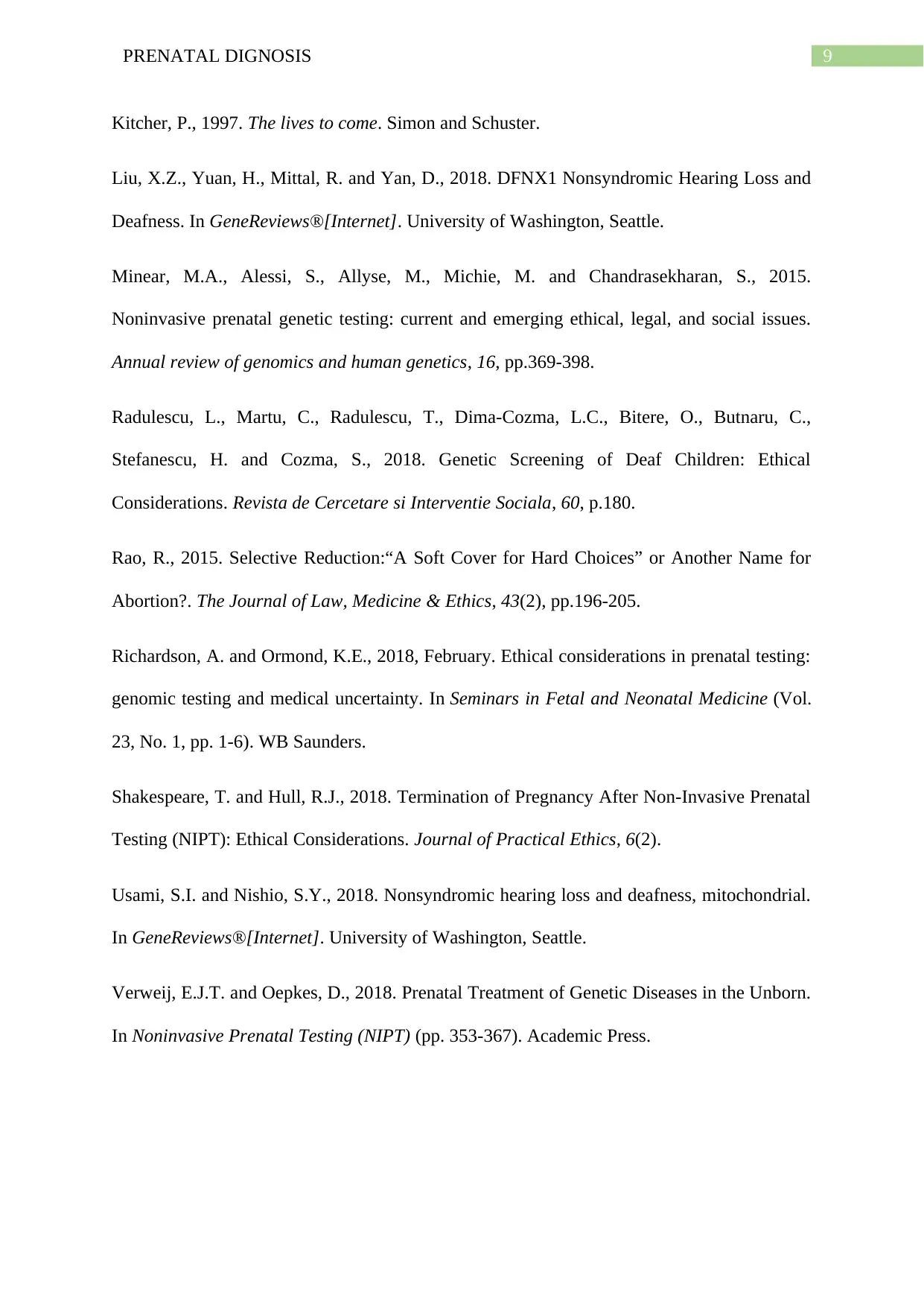
9PRENATAL DIGNOSIS
Kitcher, P., 1997. The lives to come. Simon and Schuster.
Liu, X.Z., Yuan, H., Mittal, R. and Yan, D., 2018. DFNX1 Nonsyndromic Hearing Loss and
Deafness. In GeneReviews®[Internet]. University of Washington, Seattle.
Minear, M.A., Alessi, S., Allyse, M., Michie, M. and Chandrasekharan, S., 2015.
Noninvasive prenatal genetic testing: current and emerging ethical, legal, and social issues.
Annual review of genomics and human genetics, 16, pp.369-398.
Radulescu, L., Martu, C., Radulescu, T., Dima-Cozma, L.C., Bitere, O., Butnaru, C.,
Stefanescu, H. and Cozma, S., 2018. Genetic Screening of Deaf Children: Ethical
Considerations. Revista de Cercetare si Interventie Sociala, 60, p.180.
Rao, R., 2015. Selective Reduction:“A Soft Cover for Hard Choices” or Another Name for
Abortion?. The Journal of Law, Medicine & Ethics, 43(2), pp.196-205.
Richardson, A. and Ormond, K.E., 2018, February. Ethical considerations in prenatal testing:
genomic testing and medical uncertainty. In Seminars in Fetal and Neonatal Medicine (Vol.
23, No. 1, pp. 1-6). WB Saunders.
Shakespeare, T. and Hull, R.J., 2018. Termination of Pregnancy After Non-Invasive Prenatal
Testing (NIPT): Ethical Considerations. Journal of Practical Ethics, 6(2).
Usami, S.I. and Nishio, S.Y., 2018. Nonsyndromic hearing loss and deafness, mitochondrial.
In GeneReviews®[Internet]. University of Washington, Seattle.
Verweij, E.J.T. and Oepkes, D., 2018. Prenatal Treatment of Genetic Diseases in the Unborn.
In Noninvasive Prenatal Testing (NIPT) (pp. 353-367). Academic Press.
Kitcher, P., 1997. The lives to come. Simon and Schuster.
Liu, X.Z., Yuan, H., Mittal, R. and Yan, D., 2018. DFNX1 Nonsyndromic Hearing Loss and
Deafness. In GeneReviews®[Internet]. University of Washington, Seattle.
Minear, M.A., Alessi, S., Allyse, M., Michie, M. and Chandrasekharan, S., 2015.
Noninvasive prenatal genetic testing: current and emerging ethical, legal, and social issues.
Annual review of genomics and human genetics, 16, pp.369-398.
Radulescu, L., Martu, C., Radulescu, T., Dima-Cozma, L.C., Bitere, O., Butnaru, C.,
Stefanescu, H. and Cozma, S., 2018. Genetic Screening of Deaf Children: Ethical
Considerations. Revista de Cercetare si Interventie Sociala, 60, p.180.
Rao, R., 2015. Selective Reduction:“A Soft Cover for Hard Choices” or Another Name for
Abortion?. The Journal of Law, Medicine & Ethics, 43(2), pp.196-205.
Richardson, A. and Ormond, K.E., 2018, February. Ethical considerations in prenatal testing:
genomic testing and medical uncertainty. In Seminars in Fetal and Neonatal Medicine (Vol.
23, No. 1, pp. 1-6). WB Saunders.
Shakespeare, T. and Hull, R.J., 2018. Termination of Pregnancy After Non-Invasive Prenatal
Testing (NIPT): Ethical Considerations. Journal of Practical Ethics, 6(2).
Usami, S.I. and Nishio, S.Y., 2018. Nonsyndromic hearing loss and deafness, mitochondrial.
In GeneReviews®[Internet]. University of Washington, Seattle.
Verweij, E.J.T. and Oepkes, D., 2018. Prenatal Treatment of Genetic Diseases in the Unborn.
In Noninvasive Prenatal Testing (NIPT) (pp. 353-367). Academic Press.
1 out of 10
Related Documents
Your All-in-One AI-Powered Toolkit for Academic Success.
+13062052269
info@desklib.com
Available 24*7 on WhatsApp / Email
![[object Object]](/_next/static/media/star-bottom.7253800d.svg)
Unlock your academic potential
© 2024 | Zucol Services PVT LTD | All rights reserved.




